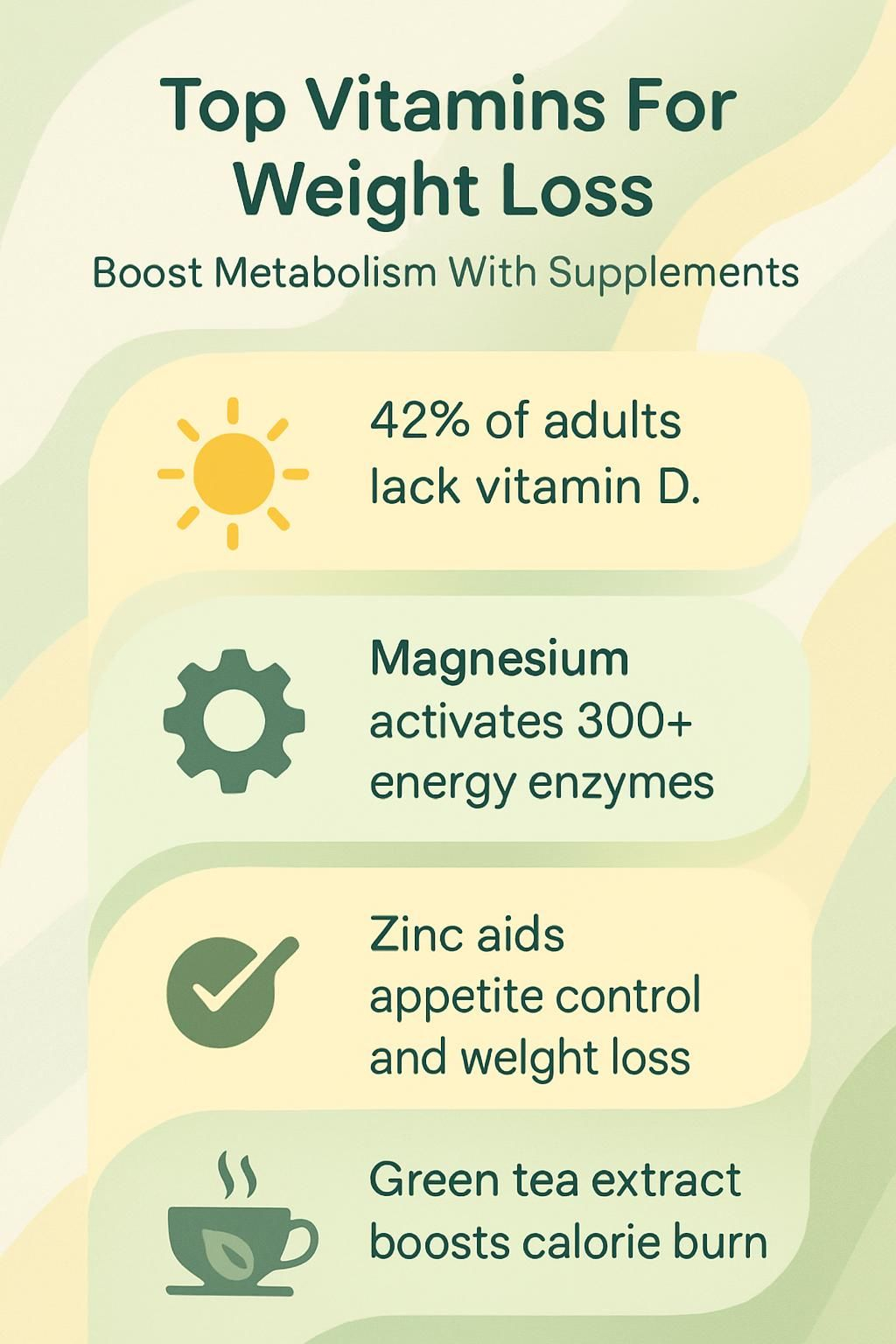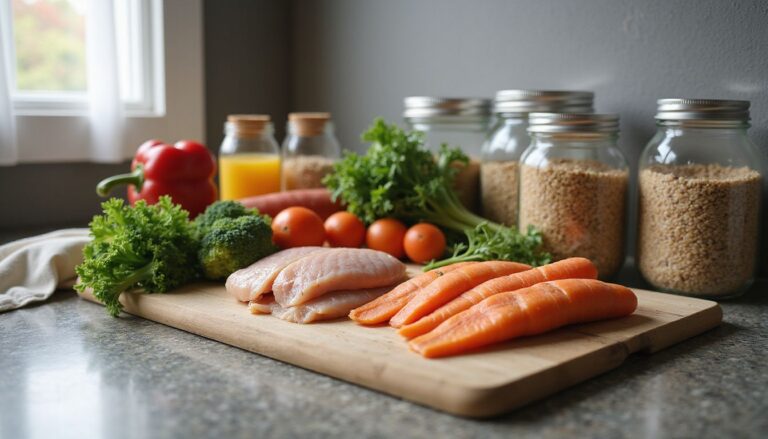Top Vitamins For Weight Loss: Boost Metabolism With Supplements
Our Nutrition Assistant AI Suite will transform your body. You will lose fat, get toned, and build muscle. Gain confidence and optimal health.
You work hard to lose weight with a healthy diet and regular exercise, yet progress can feel slow. Key vitamins and minerals support metabolism, the process that turns food into energy, and they can help you burn more calories throughout the day. Using the right supplements for weight loss, together with smart eating and movement, gives your plan a helpful lift.
This guide shows how specific vitamins and supplements support energy use, appetite control, and fat burning. You will see what to eat, when to consider a dietary supplement, and how to stay safe while improving weight management.
Key Takeaways
- B vitamins, vitamin D, magnesium, zinc, green tea extract, calcium, and iron support metabolism. They work best when combined with a balanced diet and exercise.
- About 42 percent of U.S. adults have low vitamin D. Research shows correcting low levels can support energy and fat burning.
- Magnesium activates over 300 enzymes for energy production, while iron carries oxygen that supports stamina during activity.
- Low zinc can disrupt appetite hormones. Under medical care, zinc supplements helped some people lose more weight.
- Green tea extract, rich in catechins like EGCG, increases thermogenesis and daily calorie burn without the harsh stimulant effects linked to Ephedra.

Why Vitamins Matter for Weight Loss

Vitamins and minerals act like small switches that help your body use calories for energy. When you get enough of these nutrients, your metabolism works smoothly, which supports weight loss.
How do vitamins affect metabolism?
Your cells need specific nutrients to convert food into usable energy. B vitamins, including B12, B6, and folate, help break down carbohydrates, fats, and proteins so your body can use them as fuel.
Low levels can slow your metabolism and increase fatigue. Magnesium supports muscle function and ATP production, the energy currency in your cells. Vitamin D influences fat storage and insulin resistance, which is when cells do not respond well to insulin. Chromium helps move glucose, or blood sugar, into cells to use as energy.
Keeping these micronutrients in a healthy range helps you sustain an active metabolism. If you are deficient, you may feel tired or see slower results despite solid effort.
B vitamins act like spark plugs that ignite the process of turning food into energy.
Can vitamins replace diet and exercise?
Vitamins and supplements can help support a healthy metabolism, but they do not replace a balanced diet and regular exercise. Guidance from the Mayo Clinic and the National Center for Complementary and Integrative Health notes that lasting weight loss comes from daily habits: nutritious meals, physical activity, hydration, and enough sleep.
Supplements fill gaps rather than cure obesity or remove body fat on their own. If a test shows low vitamin D or magnesium, fixing the shortage can boost energy and support your program. Yet supplements alone rarely change weight if unhealthy eating and inactivity continue.
Use the lowest effective dose and follow your clinician’s advice. Food sources often absorb better than pills. Regulatory agencies like the Food and Drug Administration do not approve supplements as treatments for disease.
B Vitamins for Weight Loss
B vitamins help your body turn food into energy. They also support brain function and hormone balance, which matter for appetite and stamina.
How do B vitamins boost metabolism?
Vitamins B6, folate, and B12 help your body break down carbs, fats, and proteins into fuel. Without enough, cells cannot process energy well, which can leave you tired and slow your progress.
Vitamin B6 also supports the thyroid, a gland that sets metabolic pace. A quality B complex may help people with low intake maintain steady energy while managing blood sugar.
B vitamins are metabolism boosters because they help you convert what you eat into usable energy,notes Dr. Rachel Johnson.
Keeping B vitamins in range supports fat burning and can make calorie control feel easier.
What foods provide B vitamins?
You can meet your needs through simple, everyday foods.
- Leafy greens like spinach and romaine provide folate and thiamine to support metabolism.
- Whole grains such as oatmeal and brown rice supply niacin, riboflavin, and B6.
- Lean proteins like chicken, eggs, fish, and turkey provide B12 and pantothenic acid.
- Legumes including beans, peas, peanuts, and lentils deliver B vitamins and fiber for fullness.
- Dairy foods like milk, cheese, and yogurt offer riboflavin and B12.
- Seeds such as sunflower seeds add biotin along with minerals your metabolism uses.
- Some people still fall short due to age, medications, or lower calorie intake.
If your intake is inconsistent, a B complex may help you meet daily goals.
What are the benefits of B-complex supplements?
A B complex can cover gaps if you eat fewer calories, avoid animal foods, or have increased needs. People low in B vitamins often feel fatigued and may have slower metabolic activity and hormone disruptions.
For plant-forward or low-calorie diets, a B complex supports energy production and thyroid function. Ask your healthcare provider to check levels if you have ongoing low energy or numbness in hands or feet, which can be signs of deficiency.
Vitamin D and Weight Management
Vitamin D supports how your body stores and burns fat. Many adults have low vitamin D, so getting enough can help your weight plan and your immune system.
How does vitamin D regulate fat?
Vitamin D helps cells use calcium, a mineral involved in how fat tissue stores and breaks down fatty acids. Healthy vitamin D status can also improve insulin resistance, especially in people with type 2 diabetes. That shift helps your body use blood sugar for energy instead of storing it as belly fat.
Low vitamin D has been linked to a higher risk of obesity and larger waist size. Keeping levels in the healthy range supports energy, appetite control, and immune defense.
Where can I get vitamin D naturally?
Food and sunlight are reliable sources. Use a mix that fits your routine.
- Fatty fish like salmon, mackerel, and sardines offer some of the highest food amounts.
- Fortified foods, such as cereals, orange juice, shakes, and plant milks, help you meet targets.
- Sunlight triggers your skin to make vitamin D. Aim for 10 to 30 minutes a few times a week, adjusting for skin tone and season.
- Egg yolks provide modest amounts that add up over time.
- Mushrooms exposed to UV light, such as maitake or portobello, are a solid plant option.
- Shrimp and crab supply small amounts plus helpful minerals.
- Short outdoor walks, paired with vitamin D rich meals, can lift energy during darker months.
These steps support fat metabolism and general wellness at the same time.
Why should I consider vitamin D supplements?
If you get little sun or eat few vitamin D foods, a supplement may be useful. Data from the National Center for Health Statistics show about 42 percent of American adults have low vitamin D.
Insufficient vitamin D can affect your metabolism and immune health, which can slow weight loss. Clinical research, including randomized trials and meta-analyses, suggests that correcting a deficiency supports energy and overall health status.
Discuss testing with your clinician. The right dose depends on your blood level, your location, and your medical history.
Vitamin C for Fat Burning
Vitamin C is an antioxidant, a compound that protects cells from damage. It also supports fat use during activity, which can help your exercise pay off.
How do antioxidants like vitamin C help with weight loss?
Antioxidants like vitamin C help reduce oxidative stress, the build up of harmful byproducts that can slow recovery. People with higher vitamin C status burned about 30 percent more fat during moderate exercise than those with lower levels1. If you deal with soreness or inflammation, steady vitamin C may help you bounce back sooner.
Fruits such as oranges and strawberries make it easy to meet daily needs. If you struggle to get enough from food, a supplement can be an extra tool, especially if your levels test low.
What are the best sources of vitamin C?
Many fruits and vegetables deliver vitamin C along with fiber and minerals.
- Oranges provide over 70 mg per medium fruit and support heart health.
- Kiwi offers about 71 mg per fruit and supports immune defenses.
- Strawberries supply around 59 mg in eight berries and add helpful fiber.
- Red bell peppers contain roughly 95 mg per half cup, which is very high.
- Broccoli gives up to 51 mg per half cup cooked and includes magnesium and iron.
- Brussels sprouts provide about 48 mg per half cup and support heart health.
- Leafy greens like kale and spinach add vitamin C plus minerals that support blood pressure.
- Grapefruit contains about 38 mg per half fruit and may aid blood sugar control.
- Tomatoes give up to 20 mg per medium fruit and pair well with many meals.
- Whole food based supplements can help if stomach issues limit produce intake.
Citrus and leafy greens are reliable choices. They fit well into most weight loss menus.
What benefits come from vitamin C supplements?
If your diet falls short, vitamin C supplements can support immune function and reduce oxidative stress. Some evidence suggests vitamin C can lessen muscle damage after hard training, which may help you return to workouts sooner.
Supplementation can also help people with low dietary intake avoid shortages without adding many calories. Choose a third party tested product and follow label directions unless your clinician prescribes another dose.
1 Johnston CS et al. Vitamin C status and fat oxidation during submaximal exercise in young adults. Nutrition and Metabolism, 2006.
Magnesium for Metabolic Support
Magnesium is a mineral that supports energy production and muscle function. Keeping it in a healthy range can improve how you feel during activity.
How does magnesium support muscle and energy?
Muscles need magnesium to contract and relax. It moves calcium and potassium into cells, which prevents cramps and supports performance.
Low magnesium can increase fatigue during exercise and slow recovery. Your body also uses magnesium to make ATP during metabolism. It activates more than 300 enzymes that convert carbs, fats, and proteins into energy.
If workouts leave you drained, improving magnesium intake through food or supplements, with medical guidance, can help you stay consistent.
Which foods are rich in magnesium?
It is simple to add magnesium to your meals.
- Leafy greens like spinach and Swiss chard provide magnesium and filling fiber.
- Whole grains such as brown rice, oats, and whole wheat bread support steady energy.
- Nuts and seeds, including almonds, cashews, pumpkin seeds, and sunflower seeds, are dense sources.
- Legumes like black beans, chickpeas, lentils, and kidney beans add magnesium and protein.
- Fish such as mackerel and salmon offer magnesium plus heart healthy fats.
- Dark chocolate with at least 70 percent cacao contains magnesium with limited sugar.
- Avocados supply magnesium and potassium for blood pressure support.
Most people can meet needs with food. If symptoms continue, ask your clinician about a supplement.
When is magnesium supplementation needed?
Consider a supplement if testing shows low levels or if your diet is limited. Higher needs can occur with heavy training or digestive conditions that reduce absorption.
Some medicines also lower magnesium. If you notice cramps, weakness, or ongoing fatigue, speak with your healthcare provider about testing. A small daily dose can help when guided by a professional.
Zinc for Appetite Regulation
Zinc helps control appetite and supports key hormones that guide hunger and fullness. Stable signals make it easier to stick with your plan.
How does zinc control hunger and hormones?
Zinc helps enzymes in the hypothalamus, the brain’s appetite center, send clear hunger and fullness signals. Low levels can increase cravings and disrupt eating patterns.
Zinc also affects insulin, which keeps blood sugar steady, and leptin, a hormone that tells you when to stop eating. Balanced leptin makes it easier to avoid overeating.
Try to meet needs with food first. Add supplements only if a test shows a shortage.
What foods contain zinc?
You can reach your zinc goals with a mix of animal and plant foods.
- Lean beef and pork, about 3 ounces, provide around 5 mg, which is over 40 percent of daily needs.
- Chicken and turkey supply moderate amounts along with protein.
- Eggs add about 0.6 mg each with very few calories.
- Oysters are the top source. Six medium oysters can deliver up to 74 mg.
- Cashews and almonds provide up to 1.6 mg per ounce.
- Whole grains like quinoa, brown rice, and fortified cereals add plant based zinc.
- Beans and lentils give 1 to 2 mg per half cup plus fiber for fullness.
- Yogurt and cheese offer smaller amounts together with calcium.
- Pumpkin and sesame seeds are easy add ons to salads or oatmeal.
Using several of these foods across the week helps you meet your daily target without high dose supplements.
Can zinc supplements aid weight loss?
In people with low zinc, supplements may improve appetite control and support weight loss. A 2013 study found that adults with obesity and low zinc lost more weight after taking zinc for 15 weeks than those taking a placebo.
Zinc supports leptin, the fullness hormone. If food sources are limited, your clinician may suggest a supplement. Do not exceed the recommended dose, since too much zinc can cause nausea or affect blood pressure.
For extra metabolic support, learn how green tea extract works below.
Green Tea Extract for Metabolism Boost
Green tea extract offers a gentle lift. It can help you burn a few more calories each day.
What are catechins and how do they burn fat?
Catechins are antioxidants in green tea. They increase thermogenesis, the heat making process your body uses to burn calories.
EGCG, the main catechin, can raise fat oxidation during exercise and at rest. Adding green tea to a balanced plan may improve your overall calorie burn.
What are the benefits of green tea supplements?
Green tea supplements support weight management by boosting metabolism. Studies show EGCG helps your body use more fat for energy during activity and daily life.
Many weight loss products include green tea because it works without the intense stimulant effects linked to Ephedra. Choose a product that is third party tested and follow directions on the label.
Calcium for Fat Absorption
Calcium supports bones and may reduce the amount of fat your body absorbs from meals. Strong bones also help you move with confidence.
How does calcium help with weight loss?
Calcium can bind with dietary fat in your gut, forming compounds that you pass instead of absorb. This effect may lower total fat uptake from a meal.
Dairy, leafy greens, and fortified foods make it simple to reach your intake goals. A daily cup of Greek yogurt, for example, supports bones and can help control cravings with added protein.
What are good dietary sources of calcium?
You can meet calcium needs from familiar foods.
- Dairy products like milk, cheese, and yogurt deliver about 300 mg per cup of milk.
- Leafy greens such as collards, spinach, and kale provide plant based calcium.
- Fortified foods like orange juice, cereals, and plant milks often add calcium.
- Canned fish with bones, such as sardines or salmon, provide protein and calcium.
- Soybeans and tofu are rich in calcium if set with calcium sulfate.
- Almonds add roughly 75 mg per ounce along with healthy fats.
- Nutrition tracking tools in your web browser can help you plan higher calcium meals.
Simple swaps, like adding kale and fortified almond milk to a smoothie, can move you closer to daily targets.
When should I consider calcium supplements?
Consider a supplement if your diet is low in calcium or your needs are higher. People at risk for osteoporosis, including many women over 50, may benefit from extra calcium.
If you avoid dairy, supplements can fill the gap. Some research suggests calcium paired with vitamin D supports body composition and bone health. Ask a healthcare professional about testing and dosing before you start.
Iron for Energy and Metabolism
Iron helps carry oxygen in your blood so your cells can make energy. Low iron reduces stamina and can slow your metabolism.
Why is iron important for energy and metabolism?
Iron is required to make hemoglobin, the protein that moves oxygen to your muscles and organs. With too little iron, less oxygen reaches tissues and fatigue sets in faster.
Even mild iron deficiency can limit your workouts and reduce calorie burn. Keeping iron in range supports steady training and daily activity.
Which foods provide iron?
Use a mix of heme iron, which absorbs well and comes from animal foods, and non heme iron from plants.
- Lean meats like beef, chicken, and turkey provide well absorbed iron.
- Leafy greens such as spinach and kale supply non heme iron. Pair with vitamin C rich foods to boost absorption.
- Fortified cereals can provide up to 18 mg per serving. Read labels for exact amounts.
- Beans and lentils are filling and versatile plant sources.
- Shellfish, including clams and oysters, offer high amounts in a small serving.
- Pumpkin seeds and other seeds add plant based iron to snacks.
- Eggs provide moderate iron plus protein for energy.
- Tofu is a useful option for vegetarian meals.
- Dark chocolate with at least 70 percent cocoa contributes some iron and antioxidants.
Building meals around these foods supports healthy iron status and better stamina for exercise.
What are the best iron supplement options?
Common forms include ferrous sulfate, ferrous gluconate, and ferrous fumarate. Ferrous sulfate is often chosen because it absorbs well and is widely available.
People with sensitive stomachs may prefer slow release tablets or liquids. Adults with deficiencies are often advised to take 18 to 27 milligrams daily, but your exact dose should come from your clinician. Too much iron can cause constipation or, in rare cases, toxicity, so use medical guidance and lab checks.
How to Incorporate Vitamins and Supplements into Your Routine
A simple plan helps you use vitamins and supplements in a safe, effective way. Food first, then fill gaps with targeted products.
How do I combine supplements with a balanced diet?
Build meals from nutrient rich staples: fatty fish, leafy greens, citrus fruits, legumes, and fortified grains. Salmon provides vitamin D and B vitamins. Spinach gives magnesium and iron. Citrus adds vitamin C for recovery.
Use supplements to fill proven gaps. Examples include a B complex for low intake, vitamin D in winter, or iron after your clinician confirms deficiency. Tracking apps and simple web tools can help you log meals and dosages, but whole food should stay the priority.
If many Americans are low in vitamin D, as CDC reports suggest, ask your clinician about a test before you take supplements for weight loss.
When should I consult a healthcare professional?
Talk with a healthcare professional before starting any new vitamin or weight loss supplement, especially if you take medications or have a medical condition. Some ingredients, including strong stimulants like Ephedra, can interact with prescriptions or raise safety concerns.
Seek advice if you are pregnant or breastfeeding. A clinician can order lab tests, identify shortages, and advise safe doses. This prevents unnecessary products and helps you choose supplements that match your goals.
Precautions When Using Vitamin Supplements for Weight Loss
Supplements can interact with medicines and other nutrients. Smart safety steps protect your progress and your health.
What are the risks of taking too many vitamins?
Taking more than you need can cause toxicity. Excess vitamin A can damage the liver and blur vision. High vitamin D can raise blood calcium, which may cause nausea, confusion, or kidney stress. Too much iron can irritate the stomach and strain organs.
Fat soluble vitamins, such as A, D, E, and K, store in body tissues. They do not leave easily in urine like most water soluble vitamins, so the risk rises when you exceed the recommended dose. Strong stimulants can also cause jitteriness or headaches if overused.
| Vitamin | Potential Harm from Overuse | Common Symptoms |
|---|---|---|
| Vitamin A | Liver damage | Blurred vision |
| Vitamin D | High blood calcium | Nausea, kidney problems |
| Iron | Organ stress | Stomach pain |
Always follow label directions unless your clinician prescribes otherwise.
Why is medical advice important before supplementing?
Healthcare providers review your history, medications, and lab work to set safe doses and prevent interactions. Some vitamins and minerals can interfere with drugs or make certain conditions worse.
Professional guidance helps you pick products that fit your needs for weight management and overall health. It also helps you avoid unnecessary expense and risk.
Conclusion
Choosing the right vitamins for weight loss can make your plan more effective. B vitamins, vitamin D, magnesium, zinc, green tea extract, calcium, and iron support metabolism and energy production in different ways.
Focus on whole foods first, then use targeted supplements for confirmed gaps. Read labels, aim for third party tested products, and avoid risky stimulants like Ephedra. Check with a healthcare professional before you take supplements, especially if you have medical conditions or take medicines.
With smart nutrition, steady movement, and careful supplement use, you can support a healthier metabolism and build habits that last.
FAQs
1. What is Ephedra and how does it relate to weight loss supplements?
Ephedra, a plant used in some traditional medicines, contains compounds that can stimulate metabolism. Some weight loss supplements include Ephedra extracts because research shows these compounds may help increase calorie burn and support fat reduction when combined with diet and exercise (Haller & Benowitz, 2000).
2. Are vitamins alone enough for effective weight loss?
Vitamins play a role in supporting metabolic health but do not cause significant weight loss by themselves. Studies show that while certain vitamins like B-complex or vitamin D can aid energy production, combining them with lifestyle changes such as balanced nutrition and physical activity yields better results (Mason et al., 2014).
3. Is using Ephedra safe for everyone seeking to boost metabolism?
Ephedra has been linked to side effects including increased heart rate and high blood pressure; the FDA banned its use in dietary supplements due to safety concerns (FDA Consumer Health Information). People should consult healthcare professionals before considering products containing Ephedra.
4. How do I know if my supplement contains real Ephedra extract?
Check product labels for scientific names like “Ephedra sinica” or related terms indicating plant origin. Reliable brands provide third-party testing results confirming ingredient authenticity; always verify sources since mislabeling sometimes occurs in the supplement industry.
Summary:
Ephedra is a plant-based compound found in some metabolism-boosting supplements but carries health risks for many users. Vitamins support healthy body function yet work best alongside proper eating habits and regular movement rather than as stand-alone solutions for losing weight.







